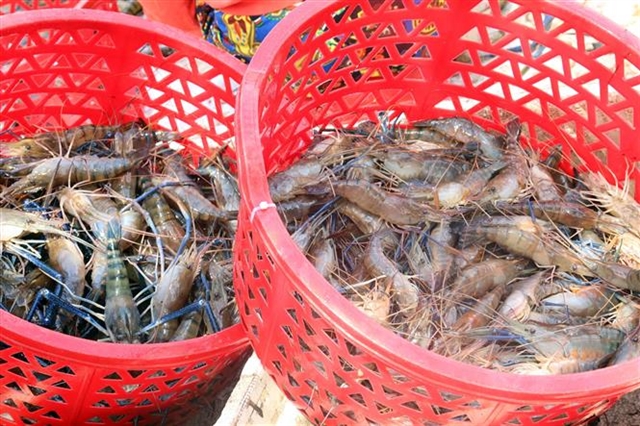This year, Việt Nam's shrimp industry aims for 1.3-1.4 million tonnes in production and US$4-4.3 billion in export turnover.

Việt Nam is strategically transitioning to green practices to elevate its role in the international seafood supply chain. — VNA/VNS Photo
HÀ NỘI — As global integration and sustainability demands intensify, Việt Nam, a top-three global shrimp exporter, is strategically transitioning to green practices to elevate its role in the international seafood supply chain.
Deputy Minister of Agriculture and Environment Phùng Đức Tiến affirmed that shrimp, a key foreign currency earner, has accounted for 13-14 per cent of global export value over the past two decades.
Nguyễn Việt Thắng, Chairman of the Vietnam Fisheries Society, noted that Vietnamese shrimp now reaches over 100 countries, including such demanding markets as the US, EU, Japan, the Republic of Korea (RoK), Australia and Canada.
Despite a positive 2025 outlook, the industry faces challenges like climate change, high production costs, disease outbreaks, competition from Ecuador and India, geopolitical instability, and stringent standards for food safety, traceability, and environmental protection.
To address these, Tiến urged businesses to adopt eco-friendly technologies and digital transformation in shrimp farming. The industry is deploying advanced solutions like Biofloc, Micro-Nano Bubble Oxygen, Recirculating Aquaculture Systems (RAS), and the three-stage shrimp farming model to minimise waste and environmental impact. Biological products are also emerging as a key trend.
Embracing the circular economy, the sector aims to reuse 100 per cent of shrimp by-products like shells, heads, wastewater, and sludge by 2030 to create high-value products.
Globally, Việt Nam is studying sustainable models, particularly those from Ecuador, the world’s leading shrimp exporter known for its high output and market growth in China and the US. Domestically, the southernmost province of Cà Mau is spearheading sustainable shrimp farming.
Vice Chairman of the provincial People’s Committee, Lê Văn Sử, reported that its 280,000ha of shrimp farms, primarily shrimp-mangrove, shrimp-rice and integrated extensive models, include tens of thousands of hectares already certified for organic and ecological farming by international bodies.
Cà Mau’s eco-shrimp products command premium value in major markets like Europe and Japan, bolstering Việt Nam’s reputation as a trusted source of sustainable seafood. This year, Việt Nam's shrimp industry aims for 1.3-1.4 million tonnes in production and US$4-4.3 billion in export turnover. Encouragingly, shrimp exports topped $605 million in the first two months of this year alone, up 46 per cent year-on-year.











